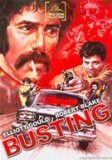| Reviews & Columns |
|
Reviews DVD TV on DVD Blu-ray 4K UHD International DVDs In Theaters Reviews by Studio Video Games Features Collector Series DVDs Easter Egg Database Interviews DVD Talk Radio Feature Articles Columns Anime Talk DVD Savant Horror DVDs The M.O.D. Squad Art House HD Talk Silent DVD
|
DVD Talk Forum |
|
|
| Resources |
|
DVD Price Search Customer Service #'s RCE Info Links |
|
Columns
|
|
|
Busting
"You guys have been watching too many moving picture films."
An overlooked gem from the violent, cynical '70s...and a personal favorite of mine. M-G-M's own M.O.D. (manufactured on demand) service, the Limited Edition Collection, for hard-to-find library and cult titles, has released Busting, the 1974 buddy cop actioner from United Artists, written and directed Peter Hyams, and starring Elliott Gould, Robert Blake, Allen Garfield, Antonio Fargas, Michael Lerner, and Sid Haig. Terrifically exciting and completely depressing in equal doses, Busting's suffocating pessimism about "law and order," and where two ordinary cops fit into that rigged system, is relentless; this one ranks right up there with the other greats from that "golden decade" of cop movies. An original trailer is included in this okay widescreen transfer.
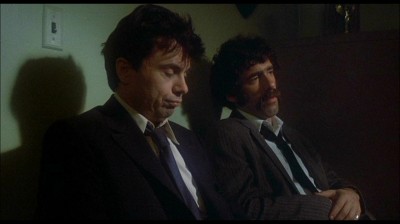
L.A. Vice detectives Keneely and Farrel (Elliott Gould and Robert Blake) know they have a solid bust with gorgeous, high-priced hooker Jackie Faraday (Cornelia Sharpe). They've been tapping her phone for a month, and now they need her latest trick, Dr. Berman, D.D.S. (Logan Ramsey), who just nailed Jackie in his dentist chair (insert your own dental joke here), to set up Keneely as a trustworthy new client. They bust Jackie, and begin to wreck her apartment until she coughs up her little black appointment book...filled with the names of prominent L.A. citizens, including some in the D.A.'s office. Before you know it, Keneely and Farrel are hauled into their superior's office, Sergeant Kenefick (John Lawrence), where it is strongly suggested they lie under oath to sabotage their case against Jackie. You see, to satisfy the higher-up officials who answer to slimy gangster Carl Rizzo (Allen Garfield)―who seemingly has everyone on the payroll―this case needs to just...go away. Just to bring home the point as to whom is really in charge, Keneely and Farrel start pulling some dirty duty, including busting a rough-and-tumble gay bar and watching out for perverts in a public park's toilet. Aware that they're completely alone, they decide to work off hours to nail Rizzo, hounding him at every turn in the hopes of forcing his hand with an upcoming dope score.
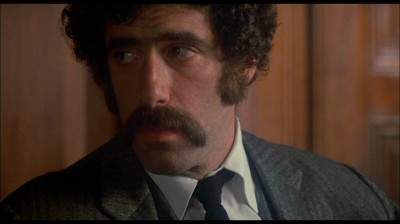
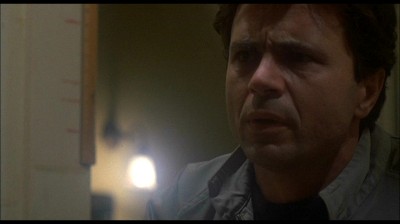
A favorite since I saw it at the drive-in when I was a kid, and one of my "holy grails" of missing DVDs now fulfilled, watching Busting in its correct widescreen ratio after I don't know how many years, I was even more impressed by the artful combination of thrills and cynical depression (a tough act to make work) that writer/director Peter Hyams pulled off with his first major big-screen directorial assignment (perhaps not surprising, either, when you factor in the veteran producers Robert Chartoff and Irwin Winkler, responsible up to that time for gritty, intelligent hits like They Shoot Horses, Don't They?, The New Centurions, and The Mechanic). Criminally not nearly as well known as its comedic doppelganger from the same year, director Richard Rush's delightfully droll Freebie and the Bean, Busting came out in February of 1974 to little business and mixed critical reception, while Freebie and the Bean, sporting two arguably "hotter" box office stars (James Caan and Alan Arkin), and reportedly held up so as not to compete with Busting, was released in December where it quickly became one of Warner Bros.' biggest hits of the year (although the critics liked it even less than Busting). Having just watched Freebie and the Bean for the umpteenth time a few weeks ago (another "holy grail" saved by M.O.D. services), it's easy to see why audiences would go for that deliberately goofy speedball, while staying away from the blackly funny but morose, futile Busting.
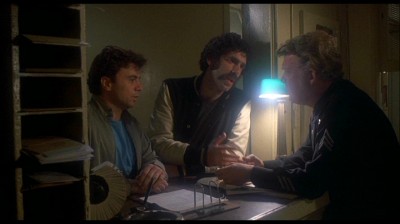
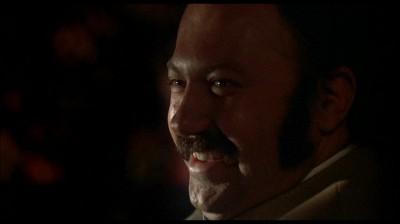
Produced and released at the approaching nadir of American cynicism and depression over the developing Watergate scandal and the ongoing Vietnam crisis, Busting's gestalt is pure early '70s American pessimism for anything that smacks of authority or "establishment." What separates Busting from other cop movies at that time that looked askance at the then-current state of law and order in America, such as Dirty Harry (where Harry had to watch helplessly as the courts sided with the attackers rather than the victims), is that Keneely and Farrel have no one on their side: not the courts, not the public, not even their own police force. No one has their back. They're completely alone in their commitment to following the law, with a growing, numbed shock of realization that even their brothers-in-arms―their fellow cops―are actively working with the criminals to at the very least humiliate them...if not to get them killed outright ("We're so f*cking alone on this thing it ain't even a joke," Blake dejectedly says to a zoned-out Gould). Rizzo runs the show, and through his pay-offs to the higher-ups in politics, the courts, and the police department, he can get any of Keneely and Farrel's busts written off without a ripple of complaint from the lower men on the totem pole who have to answer to their own corrupt superiors, or lose their jobs (the team's immediate superior says he has one job: pick up his phone that's connected to the higher-ups and answer, "Yes, sir," to anything that's said).
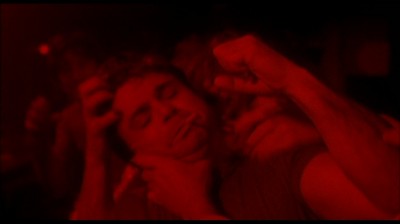
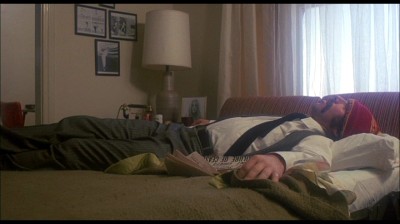
Everything in Busting is illegal and corrupt. When Keneely and Farrel bust the gorgeous hooker Jackie (lynx-eyed beauty Cornelia Sharp, looking socko in the buff), all it takes is a "someone made a phone call" threat from their immediate superior, and they know the jig is up. They ignore the Sergeant's suggestion they change their testimony (the sergeant who's smoking illegal mail-order Cuban cigars), but when they find that Jackie's little black book has been replaced with a fresh, clean one down at the Evidence Desk, Keneely finally sees how deep the fix goes ("He knows, everybody knows!" he disgustedly taunts, as he throws the counterfeit book at the on-the-take evidence sergeant, played to perfection by the gruff Richard X. Slattery). With the evidence destroyed by their very own, Keneely and Farrel no longer have a case, and Gould has to "throw" his testimony on the stand, to his own deep shame (Gould gets to do a bit of "Elliott Gould shtick" after this scene, leaving the courtroom and giving a sardonic, hallelujah reading of The Pledge of Allegiance before attacking a pimp who laughs at him). Even the crooks look at Keneely and Farrel with dulled astonishment that they're stupid enough to buck the system that's in place. When they go to bust a porno shop that features prostitution and drug dealing in the back, manager Marvin (the delightfully weasely Michael Lerner), who spots the undercover Farrel as a cop the second he walks in, chides Blake with a school marmish, "You know you're not supposed to come in here," unafraid to even name his protector, "Rizzo won't like that," because he knows Rizzo is immune. They can't even get the crooked evidence sergeant to get a warrant to search Marvin's place for drugs, because he obstinately stalls them by insisting he's not going to wake the judge up at 1:00am. So Keneely and Farrel search anyway (precipitating the movie's pulse-pounding central chase scene), and once they have the perps trapped in a building, the back-up they called for (two measly uniforms are sent) deliberately let the crooks go, forcing an enraged Keneely to call them "pigs" (and when Keneely forces the issue about the uniformed officers, their superior refuses to hear the complaint).
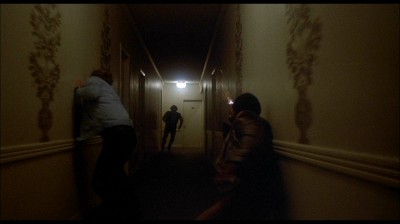
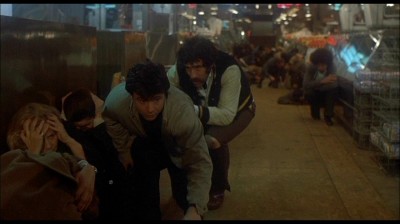
In screenwriter Hyams' world, Keneely and Farrel aren't even allowed the solace of self-denial in their efforts to bust Rizzo; they know they're completely ineffectual as vice officers because all the other cops are actively working with the criminals (Blake sneers, "Big tough cops," as he commiserates with Gould about how they can't even keep the hookers off the streets because Rizzo gets them released immediately). Busted down to humiliating toilet duty to catch perverts in the park, they still stay on Rizzo ("We sure made mincemeat outta him," Farrel fatalistically jokes after they fail to shake the gangster during a threatening interview)...but he just laughs at them, openly mocking them for their gung-ho idealism, because he's already in solid with the authorities ("What's funny is, you guys really think you're doing something," Rizzo jeers). The ending MAJOR SPOILERS AHEAD drives this point home brilliantly, with Rizzo, well and truly busted for dealing drugs in his hospital room, laughing at a disbelieving Keneely as he lays out exactly how's he's going to beat Keneely's bust. Director Hyams' freeze-frame ending on Gould's pissed-off face, with the soundtrack flash-forwarding to ex-cop Keneely applying for a civilian job, leaves absolutely no room for the audience to celebrate anything Gould or Blake did during the movie. It was all for nothing. The concept of "law and order" simply doesn't exist if you can just buy it off.
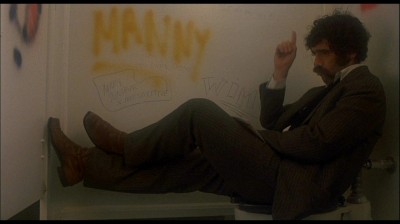
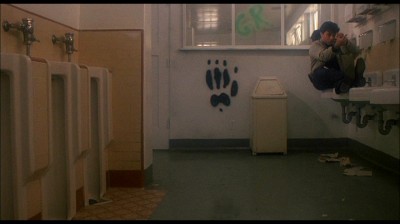
Busting's production design matches its dyspeptic moral outlook, with cinematographer Earl Rath (lots of noted, and now classic, television assignments, like Go Ask Alice, Gargoyles, and The Waltons' pilot, The Homecoming: A Christmas Story), pushing the grain and fuzzy, diffused lighting through a sea of grimy greens and yellows and reds and blacks. Director Peter Hyams, who also worked in television prior to this first assignment, immediately establishes his penchant for kinetic action sequences with several remarkable set pieces here, particularly the astounding central chase that has Rath's camera wildly dollying down narrow hallways as criminals run past and then back in front of the camera, blasting guns as the visual schematic takes front-and-back as well as lateral movement, the excitement level rising with the help of that sick, funky groove theme by noted composer Billy Goldenberg (Rath isn't using Steadycam here...because it wasn't on the market yet, but you might think so). Hyams takes the chase to L.A.s' famed Farmer's Market, where he slows the dollys down as Gould and Blake stalk the criminals, with terrified on-lookers crouching in frozen fear as Hyams sinuously glides his camera along the crowded stalls. It's a remarkable sequence, much imitated over the years by other directors (Hyams would elaborate on this technique in his other films, most notably in the sci-fi remake of High Noon, Outland, where Sean Connery has a similarly exciting foot chase), and it's bolstered by Hyams' sure hand in keeping Busting exciting throughout...even when its central message and tone are such downers.

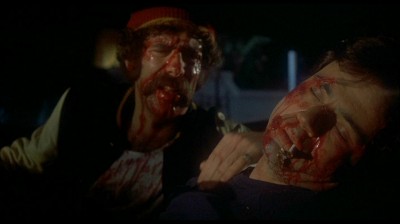
As for the leads, Gould and Blake are an inspired, if deliberately low-key, pairing. Busting came at an interesting period in their careers. Top-billed Elliott Gould, having captured the critics' and the public's imagination with his quirky, non-traditional movie star looks and charm in big hits like Paul Mazursky's Bob & Carol & Ted & Alice and Robert Altman's M*A*S*H, was by 1974 completely overexposed, running through too many film projects that were receiving at best mixed reviews from the critics and more worryingly, little response from the public: I Love My Wife, Getting Straight, Little Murders, Who?, a misplaced M*A*S*H retread, S*P*Y*S, and two brilliant but sadly neglected Robert Altman classics, California Split and the noir The Long Goodbye (his leading man status in A-list pictures wouldn't really recover from this period of oversaturation). Blake's position was even more perilous than Gould's by 1974. Having scrabbled his way back from early fame as a kid performer in the Our Gang comedies, and, after working through supporting roles in films like A Town Without Pity, PT 109, and The Greatest Story Ever Told, Blake had hit the critical big time in 1967 with his masterful lead work in Richard Brooks' riveting In Cold Blood. Starring roles followed, such as Tell Them Willie Boy is Here and in 1973 (like Gould's The Long Goodbye), Blake's own neglected classic, Electra Glide in Blue, but his film work was sporadic and unsuccessful at the box office. Indeed, Busting's failure would lead Blake to return to TV for the most iconic role of his career: Baretta.
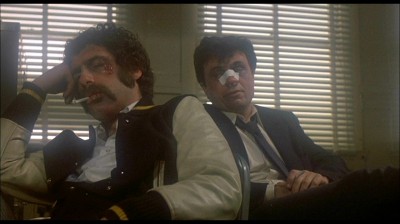
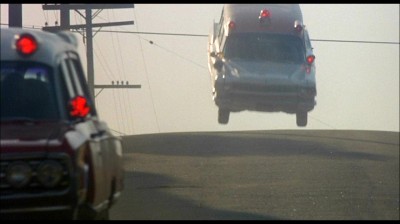
Together, Blake and Gould aren't excessively cute or even "buddy buddy" acting here; their low-key demeanor is more in keeping with Busting's overall tone. They're consistently amusing, though, with Gould doing his "Groucho Marx-as-basketball-player" bent leg and gum-chewing shtick (Hyams makes sure we get a briefly funny shot of Gould getting a stick during the Farmer's Market sequence), and Blake acting tough with his unlit cigarette and his little pre-Baretta one-liners. "Film" students (yeech) looking for a quick term paper subject the night before can make a lot out of Hyams' pushing the boundaries of the subliminal homoerotic underpinnings of the "buddy film" genre when he has the boys here dancing with each other in a gay bar (it's played for laughs, until Hyams gets serious with a scary bar fight, shot in sick neon red, as the tough drag queens beat the living sh*t out of Gould and Blake). If I had one small complaint about Busting, it would be that comparative scenes with Blake seem to be missing. We get Gould speaking about his idealism as a young cop, and a good silent sequence of Gould, shamed by his false testimony, going home to his anonymous, cramped apartment and crashing on his sofa bed...but not a glimpse of Blake off-duty (the final freeze-frame also focuses exclusively on Gould's future fate, not Blake's). It's a minor point, though, and one that doesn't detract from Busting's overall, significant achievement.
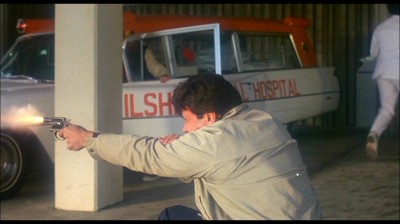
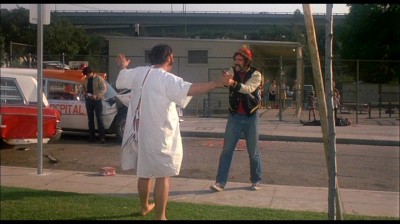
The DVD:
The Video:
When Busting used to show up on TV, some shots in the gay bar scene would be excised (after some minor complaints from activist groups at the time of the movie's release), with some "new" material added to pad out the running time (I remember Blake talking to a kid at the park, telling him to get some vitamin C for his cold). As far as I can tell, Busting is complete here, with the gay bar scene intact (and the vitamin C stuff gone). The anamorphically-enhanced, 1.85:1 widescreen image looks grainy and soft...but it was shot that way, so overall, it's a solid transfer, with some minor screen anomalies like scratches and dirt.
The Audio:
The Dolby Digital English mono audio track is acceptable, with little or no hiss, and a strong re-recording level. No subtitles or closed-captions available.
The Extras:
There's an original trailer included here―a good one, too, that really sells the picture.
Final Thoughts:
An overlooked, neglected classic; one of the best cop movies of the '70s―and that means it's one of the best cop movies ever. Director and screenwriter Peter Hyams creates a dyspeptic, sordid world (probably not too far from the truth) where everyone is either on the take or afraid to speak up, and where the efforts of two crusading cops don't amount to squat. Terrifically exciting and depressing as hell, all at the same time, with two perfectly cast leads. A knockout. On content alone, I'm giving Busting our highest ranking here at DVDTalk: the DVD Talk Collector Series award.
Paul Mavis is an internationally published film and television historian, a member of the Online Film Critics Society, and the author of The Espionage Filmography.


|
| Popular Reviews |
| Sponsored Links |
|
|
| Sponsored Links |
|
|
| Release List | Reviews | Shop | Newsletter | Forum | DVD Giveaways | Blu-Ray | Advertise |
|
Copyright 2024 DVDTalk.com All Rights Reserved. Legal Info, Privacy Policy, Terms of Use,
Manage Preferences,
Your Privacy Choices | |||||||









